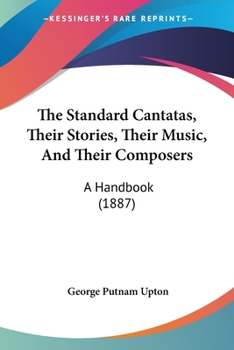The Standard Cantatas, Their Stories, Their Music, And Their Composers: A Handbook (1887)
Select Format
Select Condition 
Book Overview
""The Standard Cantatas, Their Stories, Their Music, And Their Composers: A Handbook"" is a comprehensive guidebook written by George Putnam Upton and published in 1887. The book provides detailed information about the stories, music, and composers behind some of the most famous cantatas in history. The cantatas covered in this book are considered to be the standard repertoire for choral societies and church choirs. The book is organized into chapters that cover individual cantatas, with each chapter providing a detailed history of the piece, including its origin, the story behind it, and the composer's inspiration. The music itself is also analyzed, with Upton providing insights into the structure, melody, and harmony of each piece. In addition to the individual cantatas, the book also includes a section on the history of cantatas, including their origins in Italy and their development throughout Europe. The book also provides information on the performance of cantatas, including tips for conducting and rehearsing them. Overall, ""The Standard Cantatas, Their Stories, Their Music, And Their Composers: A Handbook"" is a valuable resource for anyone interested in choral music, church music, or classical music in general. Its detailed analysis of the cantatas and their composers makes it a must-read for music enthusiasts and scholars alike.This scarce antiquarian book is a facsimile reprint of the old original and may contain some imperfections such as library marks and notations. Because we believe this work is culturally important, we have made it available as part of our commitment for protecting, preserving, and promoting the world's literature in affordable, high quality, modern editions, that are true to their original work.
Format:Paperback
Language:English
ISBN:1437339522
ISBN13:9781437339529
Release Date:December 2008
Publisher:Kessinger Publishing
Length:372 Pages
Weight:1.09 lbs.
Dimensions:0.8" x 6.0" x 9.0"
Customer Reviews
0 rating





